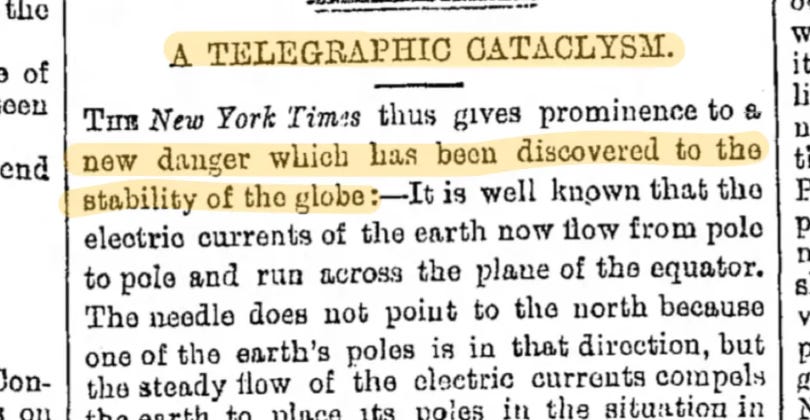The electric telegraph was a BIG deal.

Its impact on the flow of information in the 19th and 20th century was akin to the internet in the 21st. And like the web, telegraphy brought rapid changes in society along with very familiar anxieties and criticisms. (Book Rec: ‘The Victorian Internet’ by Tom Standage)
The Ivory Tower Telegraph Doomers
In the 1880s telegraphy was common place; the annihilation of time and space - between towns, cities and even continents wasn’t so strange. Excitement and disruption had turned to indifference and consolidation: Western Union developed a monopoly, becoming to the late 19th century what META is today: a big tech boogie man.

Illustration made with AI via MidJourney
In 1881 American railroad magnate Jay Gould acquired a controlling stake in Western Union and according to the New York Times - a vocal opponent of the telegraph monopoly - he hinted he’d “complete the work of girdling the earth with the electric wire by way of Alaska and Behring Strait” so that “the earth will be surrounded with a continuous wire.”

It was an endeavour the paper noted would be seen by “99 out of 100” as an “unalloyed benefit to mankind.” The Times however begged to differ and would counter the techno-optimism it attributed to the general public by citing a study from a ‘prominent academic journal’ (that we have yet to locate), which predicted the**** END OF THE WORLD. The report would be re-printed in other papers - as far away as Ireland and Australia - regarding “a new danger which has been discovered to the stability of the globe.”

Syndication of report in ‘Belfast News-Letter’ PAGE 6 Belfast, Antrim, Northern Ireland, Thursday, August 04, 1881
The dire warnings concerned the supposed “awful danger of meddling with the earths current.” The thesis being that wrapping the earth in a continuous telegraphic wire could mess with its poles. The earths axis - according to the scientists - was controlled by electric currents, determining where the north and south poles were located. If we interfered with the currents - we could change earths axis and in turn “upset the whole time table of the solar system, and bring about a series of frightful collisions.”

Illustration made with AI (MidJourney)
The result was that the north and south poles, wouldn’t be poles anymore. In turn, they would rapidly melt, sending a biblical deluge of water across the globe carrying polar bears with it.
The potential consequences of this were described in bombastic terms: “Iceland would send to shivering Italy for its ice, and, under the enervating heat of the climate, Scotland would abandon its oatmeal and the intellect of Edinburgh would be under-mined with bananas and pombe.” Africa would become cold and barren as a new polar region and in turn “The native African kings would be suddenly frozen on the ice of the new North Pole.”

Illustration made with AI (MidJourney)
New York would have a hot and tropical climate - “its inhabitants would become addicted to nudity and relapse into barbarism” - elephant hunting would be popular and Central Park would become a lush jungle with monkeys instead of squirrels, parrots instead of pigeons.

Illustration made with AI (MidJourney)
These vivid prophecies would be the “appalling results” that would “follow the girdling of the earth with a continuous line of telegraph” according to the papers authors. The Times would posit that if the public were to read these “terrible revelations” that their enthusiasm for telegraphy would be quelled, instead: “they would be ready to hang without mercy the man who should propose to complete the…telegraph.” This, echoing a similar notion The Times made a few years prior that “Edison has invented too many things” and there was a “growing conviction” he should be hung (only a year later he perfected the incandescent lightbulb.)
The Times would end the piece by wonder if Jay Gould would “persevere at the risk of exciting the ungovernable rage of his fellow creatures and compelling them to seek in lawless violence the safety of themselves and of our beloved and respectable earth?”

The telegraph industry persevered, earth would be further ‘girdled’ with telegraph wires - paving the way for global telephone networks and eventually the World Wide Web. The irony? The global telecommunications network which began with the telegraph have become a key way to reduced our reliance on old energy and transport technologies that actually are melting polar ice caps.
Note: the lack of citations raises the possibility this was satire, however - without indicating as much, and allowing it to be published and syndicated - it would still be an act of egregious fear mongering.
